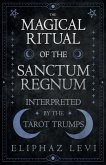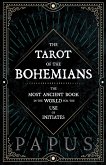This volume represents the high-water mark of the thought of Eliphas Levi. It may be regarded as written by him as his Thesis for the Grade of Exempt Adept, just as his "Ritual and Dogma" was his Thesis for the grade of a Major Adept. He is, in fact, no longer talking of things as if their sense was fixed and universal. He is beginning to see something of the contradiction inherent in the nature of things, or at any rate, he constantly illustrates the fact that the planes are to be kept separate for practical purposes, although in the final analysis they turn out to be one. This, and the extraordinarily subtle and delicate irony of which Eliphas Levi is one of the greatest masters that has ever lived, have baffled the pedantry and stupidity of such commentators as Waite. English has hardly a word to express the mental condition of such unfortunates. "Dummheit," in its strongest German sense, is about the nearest thing to it. It is as if a geographer should criticize "Gulliver's Travels" from his own particular standpoint. When Levi says that all that he asserts as an initiate is subordinate to his humble submissiveness as a Christian, and then not only remarks that the Bible, but treats the Incarnation as an allegory, it is evident that a good deal of submission will be required. In the Pope we have such an authority ready made, and it is the gravest tactical blunder to endeavour to set up an authority opposed to him. Success in doing so means war, and failure anarchy. This, however, did not prevent Levi from ceremonially casting a papal crown to the ground and crying "Death to tyranny and superstition!" in the bosom of a certain secret Areopagus of which he was the most famous member. When a man becomes a magician he looks about him for a magical weapon; and, being probably endowed with that human frailty called laziness, he hopes to find a weapon ready made. It is necessary for the reader to gain this clear conception of Levi's inmost mind, if he is to reconcile the "contradictions" which leave Waite petulant and bewildered. It is the sad privilege of the higher order of mind to be able to see both sides of every question, and to appreciate the fact that both are equally tenable. Such contradictions can, of course, only be reconciled on a higher plane, and this method of harmonizing contradictions is, therefore, the best key to the higher planes. It seems unnecessary to add anything to these few remarks. This is the only difficulty in the whole book, though in one or two passages Levi's extraordinarily keen sense of humour leads him to indulge in a little harmless bombast. We may instance his remarks on the "Grimoire" of Honorius. We have said that this is the masterpiece of Levi. He reaches an exaltation of both thought and language which is equal to that of any other writer known to us. Once it is understood that it is purely a thesis for the Grade of Exempt Adept, the reader should have no further difficulty.
Bitte wählen Sie Ihr Anliegen aus.
Rechnungen
Retourenschein anfordern
Bestellstatus
Storno









